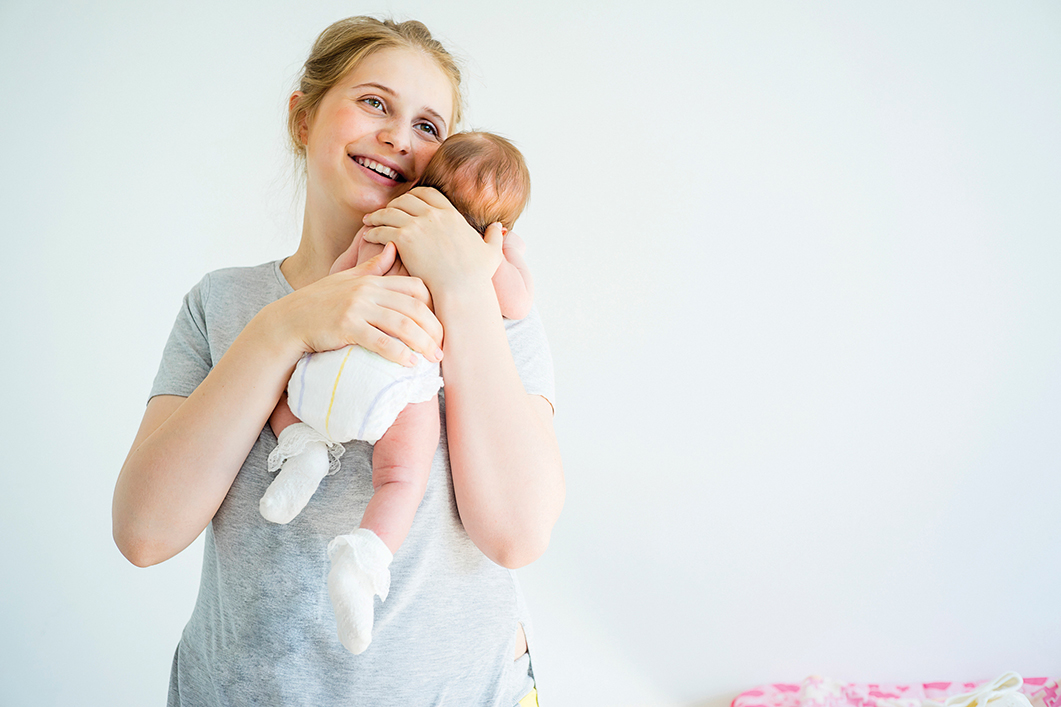Body after Baby
By Sarah Lyons

Having a baby is an exciting time, one for which you have been preparing nine months. In anticipation of your baby’s arrival, you likely researched everything from pregnancy health to car seat safety, but many women find themselves unprepared for the changes in their bodies after birth. Here is a rundown of what to expect.
Breast tenderness. After birth, your breasts will become full and tender as your body prepares to feed Baby. Your breastmilk may not come in until day three or four postpartum, but shortly after birth your body will begin producing colostrum, a special type of breastmilk, rich in nutrients and antibodies that are important for a newborn baby. Colostrum will help build your baby’s immune system. If you plan to breastfeed, work with a lactation consultant to make sure Baby is latching properly. This will help your mature milk come in and prevent sore, cracked nipples.
Cramping and bleeding. You may have thought that once Baby was born, you were done with contractions, but you will continue to experience cramps or after pains while your uterus constricts and begins to return to its normal size. These cramps are most often felt during breastfeeding. After giving birth, moms also will experience vaginal bleeding, which can be heavier than a normal period and last up to two weeks. Spotting for up to four to six weeks postpartum also is normal. If you feel you have excessive bleeding and clotting, contact your doctor.
Soreness. Giving birth is hard work! Muscle achiness and vaginal soreness are normal aftereffects. If you had a c-section, you are also recovering from major abdominal surgery. Take it easy, use pain medication as needed, ask for help and try not to overdo it. Give your body time to return to normal and practice good self-care.
Bathroom issues. It isn’t fun to talk about, but it’s a fact. We all have to go to the bathroom, and something that was simple before can become a big problem postpartum. Moms who had a vaginal birth may have a hard time pushing or straining to go to the bathroom, especially if they developed hemorrhoids during birth. Major surgery also will cause constipation, so moms who have a c-section can find using the restroom very challenging. Staying hydrated, eating high fiber foods and taking an occasional walk can help with constipation. Some doctors also may recommend a stool softener.
Mood swings. Having a baby is one of the happiest moments of your life, so why can’t you stop crying? Your body is going through all kinds of hormonal changes postpartum, and you are likely exhausted from giving birth, feeding your baby every few hours and adjusting to the demands of caring for a newborn — all on top of recovering from that childbirth. Being a little teary makes sense. Give yourself some grace, rest when possible and try to focus on the great things going on in your life. If you have feelings of hopelessness, want to harm yourself or Baby, or the feelings of sadness are overwhelming, speak to a doctor about what you’re experiencing. Postpartum depression is a real and common challenge for new moms, and seeking help when needed is an excellent thing to do.
You have been through some big changes in a short time, and your body will need to time to recover. Most moms will lose 10-12 pounds immediately after giving birth but still have a swollen, rounded belly for a few weeks. To return to your pre-pregnancy weight can take months, and weeks may pass before you feel like you can return to your normal activities. While you are recovering, give yourself the rest and proper self-care you deserve. Enjoy your new addition to the family and acknowledge the amazing things your body can do.









